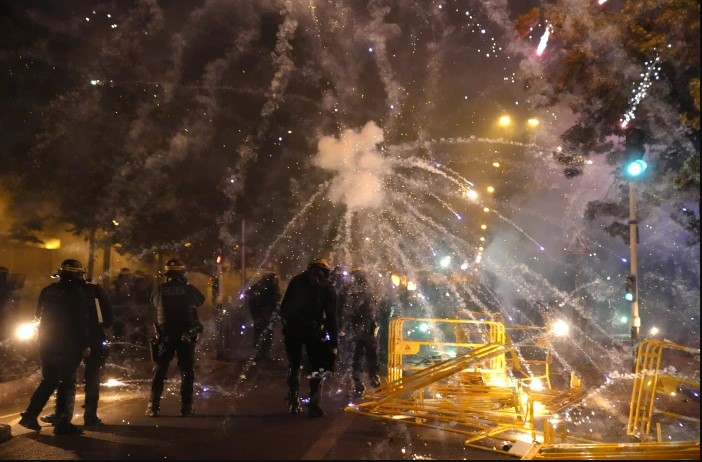By DaQuan Lawrence,
AFRO International Writer,
DLawrence@afro.com
The several nights of protest and public outrage that followed the police-involved shooting of teen driver Nahel Merzouk in France are beginning to calm down. For a week anti-riot officers dispersed tear gas to break up protests being held in Nanterre, France, in the slain 17-year old’s honor.
Police initially reported that one officer shot at the teenager because he was driving his car at him, but this account has been proven false by a video on social media and authenticated by AFP.
The footage reveals the two police officers standing by the side of the motionless car, with one aiming a weapon at the driver. A voice is heard saying: “You are going to get a bullet in the head.”
An unidentified 38-year-old officer has been detained and is under investigation for voluntary manslaughter. French President Emmanuel Macron said on June 28 that the shooting was “inexplicable” and “unforgivable.”
Macron added that the incident had “moved the entire nation” and “nothing can justify the death of a young person.”
Nahel’s lawyer, Yassine Bouzrou, said he plans to file a legal complaint against the officer for voluntary manslaughter and against his colleague for complicity in the shooting.
Bouzrou also mentioned he plans to file a complaint against the policemen for providing false testimony and claiming that Nahel had tried to run them over.
Many people around France and the international community are standing in solidarity within Nahel’s family and protestors who are bringing attention to an unjust and unchecked pattern of police force used against Black and immigrant communities.
Kylian Mbappé, captain of the French men’s national football team and star player at Paris Saint-Germain, tweeted, that the shooting was “an unacceptable situation.”
“All my thoughts go to the friends and family of Naël, that little angel who left us far too soon. I am hurting for my France,” Mbappé said.
Actor Omar Sy, said on Twitter: “I hope that justice worthy of the name will honor the memory of this child.”
There were public riots in several French cities after the shooting occurred in the suburb west of Paris on June 27, with protestors setting buildings ablaze, damaging cars, and igniting fireworks outside of police stations. Up to 180 people have been arrested and 170 officers have allegedly been injured since protests began.
June 28 night saw approximately 9,000 officers deployed with another 40,000 deployed across France on June 29 to contain the public’s response, according to Minister of the Interior, Gérald Darmanin.
Darmanin, who has previously supported the French police force in similar situations, called the video footage “extremely shocking” in parliament.
The protests continued into the first few days of July.
Despite anger and public scrutiny at racially motivated police violence within the nation, France used a militarized response to the public’s reaction to the teen’s death, which was caused by an agent of the state.
The overtly militarized state response to the public can be viewed as draconian, considering the growing list of beatings by officers and consequent deaths in custody, which have led to widespread scrutiny of police maneuvers and have provoked protests in the past.
Jean-Luc Mélenchon, a far-left politician called for “a complete redesign of the police force” and reprimanded the transgressions of police by saying that France “no longer has the death penalty.”
Previous riots due to police brutality have lasted for weeks, with protestors demanding changes for longstanding discrimination, lack of opportunities and police harassment in French suburbs with large immigrant populations.
A French citizen of Algerian and Moroccan descent, Nahel is the most recent victim of senseless and persistent persecution by French authorities, a negative trend that has continued through the early 21st century and drawn accusations of police violence and brutality.
In Jan. 2020, Cédric Chouviat, a 42-year-old deliveryman died after officers pinned him to the ground and put him in a chokehold near the Eiffel Tower, while police officers beat Michel Zecler, a 41-year old French music producer, for six minutes in the entrance area of his Paris studio in Nov. of the same year.
In 2017, then 22-year old, Théodore Luhaka was hospitalized after he was beaten and had a baton shoved into his buttocks. Next year the officers are scheduled to appear in court.
In 2016, Adama Traoré, died of asphyxiation after fleeing an identification check and being arrested by three officers who placed “the weight of all bodies” on Mr. Traoré on his 24th birthday. It is still unknown whether the officers will face trial.
His sister, human rights activist Assa Traoré, leads The Truth for Adama, an advocacy group that demands justice for Mr. Traoré, and has organized some of the biggest antiracism protests in Europe.
In 2005, teenagers Zyed Benna, 17, and Bouna Traoré, 15, died in an electricity substation hiding from the police in an impoverished suburb north of Paris. Their deaths led to massive riots in Paris suburbs that spread across France.
Green Party officials spoke out against police violence in France, denouncing the “Americanization” of French police tactics.
“What I see in this video is a 17-year-old kid being executed, in France in 2023, by a police officer on a public highway,” said the Green Party’s’ Marine Tondelier.
“It seems like we are heading towards an Americanization of the police,” she warned, adding refusal to comply with police orders is normally “three years in prison and a fine of 75,000 euros– not a bullet in the head.”
The post Public outrage over Black teen killed by French law enforcement calms appeared first on AFRO American Newspapers .











